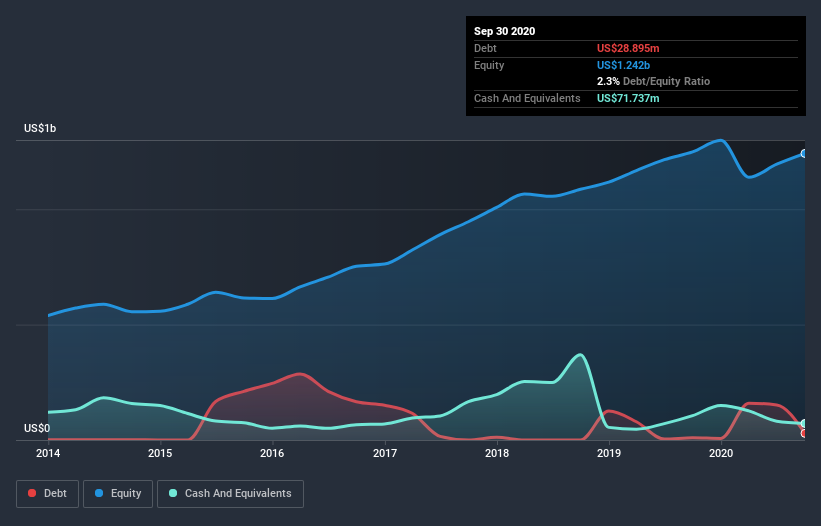Is Maximus (NYSE:MMS) Using Too Much Debt?
Howard Marks put it nicely when he said that, rather than worrying about share price volatility, 'The possibility of permanent loss is the risk I worry about... and every practical investor I know worries about.' So it seems the smart money knows that debt - which is usually involved in bankruptcies - is a very important factor, when you assess how risky a company is. We note that Maximus, Inc. (NYSE:MMS) does have debt on its balance sheet. But the real question is whether this debt is making the company risky.
When Is Debt A Problem?
Generally speaking, debt only becomes a real problem when a company can't easily pay it off, either by raising capital or with its own cash flow. If things get really bad, the lenders can take control of the business. While that is not too common, we often do see indebted companies permanently diluting shareholders because lenders force them to raise capital at a distressed price. Of course, plenty of companies use debt to fund growth, without any negative consequences. When we examine debt levels, we first consider both cash and debt levels, together.
See our latest analysis for Maximus
What Is Maximus's Debt?
As you can see below, at the end of September 2020, Maximus had US$28.9m of debt, up from US$9.89m a year ago. Click the image for more detail. However, its balance sheet shows it holds US$71.7m in cash, so it actually has US$42.8m net cash.
How Strong Is Maximus's Balance Sheet?
According to the last reported balance sheet, Maximus had liabilities of US$561.2m due within 12 months, and liabilities of US$221.7m due beyond 12 months. On the other hand, it had cash of US$71.7m and US$788.3m worth of receivables due within a year. So it can boast US$77.1m more liquid assets than total liabilities.
Having regard to Maximus's size, it seems that its liquid assets are well balanced with its total liabilities. So it's very unlikely that the US$4.51b company is short on cash, but still worth keeping an eye on the balance sheet. Simply put, the fact that Maximus has more cash than debt is arguably a good indication that it can manage its debt safely.
But the other side of the story is that Maximus saw its EBIT decline by 8.4% over the last year. That sort of decline, if sustained, will obviously make debt harder to handle. The balance sheet is clearly the area to focus on when you are analysing debt. But it is future earnings, more than anything, that will determine Maximus's ability to maintain a healthy balance sheet going forward. So if you're focused on the future you can check out this free report showing analyst profit forecasts.
Finally, while the tax-man may adore accounting profits, lenders only accept cold hard cash. Maximus may have net cash on the balance sheet, but it is still interesting to look at how well the business converts its earnings before interest and tax (EBIT) to free cash flow, because that will influence both its need for, and its capacity to manage debt. During the last three years, Maximus generated free cash flow amounting to a very robust 86% of its EBIT, more than we'd expect. That puts it in a very strong position to pay down debt.
Summing up
While it is always sensible to investigate a company's debt, in this case Maximus has US$42.8m in net cash and a decent-looking balance sheet. And it impressed us with free cash flow of US$204m, being 86% of its EBIT. So is Maximus's debt a risk? It doesn't seem so to us. There's no doubt that we learn most about debt from the balance sheet. However, not all investment risk resides within the balance sheet - far from it. For instance, we've identified 1 warning sign for Maximus that you should be aware of.
At the end of the day, it's often better to focus on companies that are free from net debt. You can access our special list of such companies (all with a track record of profit growth). It's free.
This article by Simply Wall St is general in nature. It does not constitute a recommendation to buy or sell any stock, and does not take account of your objectives, or your financial situation. We aim to bring you long-term focused analysis driven by fundamental data. Note that our analysis may not factor in the latest price-sensitive company announcements or qualitative material. Simply Wall St has no position in any stocks mentioned.
Have feedback on this article? Concerned about the content? Get in touch with us directly. Alternatively, email editorial-team@simplywallst.com.

 Yahoo Movies
Yahoo Movies 

